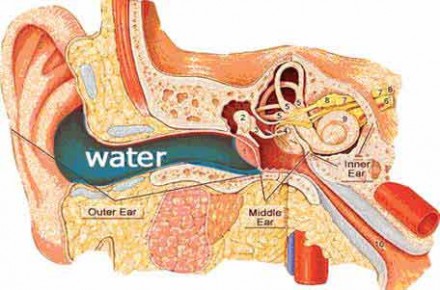RWII Prevention Week
The week before Memorial Day (May 23–29, 2011) is Recreational Water Illness and Injury (RWII) Prevention Week. The goal of this observance is to raise awareness about healthy and safe swimming behaviors, including ways to prevent recreational water illnesses (RWIs) and injuries. RWIs are caused by germs spread by swallowing, breathing in mists or aerosols of, or having contact with contaminated water in swimming pools, hot tubs, water parks, water play areas, interactive fountains, lakes, rivers, or oceans. RWIs can also be caused by chemicals in the water or chemicals that evaporate from the water and cause indoor air quality problems.
Swimmer’s Ear
Swimmer’s ear (also known as otitis externa) is an infection of the outer ear canal that can cause pain and discomfort for swimmers of all ages. Swimmer’s ear affects millions of Americans every year and results in hundreds of millions of dollars in hospitalization costs. The good news is that swimmer’s ear is preventable. This year, to help ensure a healthy and pain-free swimming experience, the Centers for Disease Control and Prevention (CDC) is encouraging swimmers to follow the Swimmer’s Ear Prevention Guidelines below.
Swimmer’s Ear Prevention Guidelines
DO keep your ears as dry as possible. Use a bathing cap, ear plugs, or custom-fitted swim molds when swimming.
DO dry your ears thoroughly after swimming or showering. Use a towel to dry your ears well. Tilt your head to hold each ear facing down to allow water to escape the ear canal. Pull your earlobe in different directions while the ear is faced down to help water drain out. If there is still water left in ears, consider using a hair dryer to move air through the ear canal. Put the dryer on the lowest heat and speed/fan setting; hold it several inches from the ear.
DON’T put objects in the ear canal (including cotton-tip swabs, pencils, paperclips, or fingers).
DON’T try to remove ear wax. Ear wax helps protect your ear canal from infection. If you think that the ear canal is blocked by ear wax, consult your healthcare provider.
CONSULT your healthcare provider about using ear drops after swimming. Drops should not be used by people with ear tubes, damaged ear drums, outer ear infections, or ear drainage (pus or liquid coming from the ear).
CONSULT your healthcare provider if you have ear pain, discomfort, or drainage from your ears.
 Parker Live News from the Parker Strip since 2009.
Parker Live News from the Parker Strip since 2009.






Thanks John. I love the graphics that go along with it. I’m one of those people who get swimmer’s ear every year. It can be painful and then I can’t hear and I am yelling at everyone because my ears are clogged up. I’m taking my own agency’s advice and using ear plugs this year!